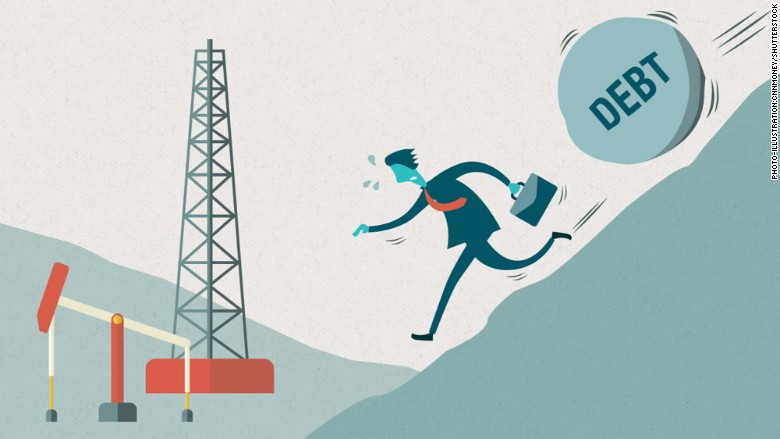
The American energy boom fueled the birth of hundreds of new oil companies. Now some of them may need to die.
The big problem facing the oil industry is that the prices are extremely low because the world has too much oil. Even though oil is sitting below $50 a barrel, American shale oil producers continue to pump at a ferocious pace. At the same time, OPEC refuses to cut production.
But some companies aren't making enough anymore to keep going. Something has to give -- and right now that something doesn't look like it will be OPEC.
"The only other way to bring a crude glut of this magnitude under control is a massive wave of bankruptcies among the independent crude oil producers," said Walter Zimmerman, chief technical analyst at United-ICAP.
Zimmerman is no stranger to commodity bubbles bursting. He's witnessed three different boom-and-bust cycles and knows they end in tears for the financially weaker companies.
"It's survival of the fittest," said Fadel Gheit, an analyst who covers big energy companies at Oppenheimer & Co. "Many smaller, high-debt companies will be acquired as they cannot survive low oil prices for an extended period. I think the next six months could be difficult."
Related: Some companies won't survive oil meltdown
So how did we get here?
When oil prices were sky high -- $80 or above -- for much of the last decade, investors poured a ton of money into new technologies aimed at extracting more oil from the ground. America's shale energy boom came from horizontal fracking -- the ability to drill up to a mile horizontally under the ground.
"Everybody saw dollar signs," said Zimmerman.
U.S. crude oil production has nearly doubled from 5 million barrels per day in 2008 to 9.5 million in May, according to the U.S. Energy Information Administration.
But now the world has too much oil. Prices crumbled from $100 a barrel last June to settle as low as $43.46 in March. Many thought U.S. production would fall off a cliff now that prices are cheap, but it's been remarkably resilient.
Related: World's top oil and nat gas producers
Wave of fire sales or bankruptcies
Some companies are able to keep pumping oil because of new efficiencies and cost reductions that make drilling for oil profitable, even at low prices.
But other companies are highly leveraged. They need to keep pumping oil just to have enough make their debt payments. They don't have the luxury of stopping.
The problem is eventually the banks may yank the credit lines they survive on. Typically, these loans are secured with hedges against the price of crude oil falling. Many of these hedges have expired or are about to do so. Hedging at today's prices could lock in a loss, something banks wouldn't agree to anyway.
Zimmerman said that scenario could lead to a wave of fire sales of distressed oil companies to larger rivals with far deeper pockets. Other embattled companies could file for bankruptcy, leaving the banks as owners of the wells. Those assets would quickly be sold off to larger energy companies.
Related: Texas banker: Let the reckless oil companies die
Shopping spree
In either case, the financially strong stand to gain from the turmoil.
While the consolidation in the oil patch could get ugly, it may end up balancing out the oil market. That's because the larger oil companies can afford to buy the wells and cut back on drilling or even cap it. They don't need to worry about paying back loans.
"I'm urging U.S. crude oil producers to draw up a shopping list of assets you would like to purchase for pennies on the dollar," said Zimmerman.


